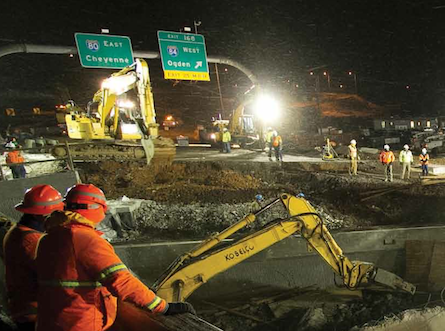Project News
Flatiron Construction Moves Utah Bridge Overnight

On a cold night in early March, with temperatures well below freezing and snow falling, Flatiron Construction crews began the second of two operations to replace twin bridges over the Weber River on Interstate 80 in Summit County, Utah.
The $5 million design-build project used a technique called accelerated bridge construction, a first for Flatiron, during which crews construct a new bridge next to an existing bridge that needs to be replaced. Once the new structure is complete, crews demolish the existing bridge and move the new one into place in just a few hours. Accelerated bridge construction dramatically minimizes inconvenience to the public. In traditional construction, a bridge is partially or completely closed for weeks or months to allow for new construction, which often means traffic headaches for the public. With ABC the highway remains open, closing for only a few hours, usually overnight, while the new bridge is moved into place.
“In one fell swoop we come in and demo out the old bridge and replace it,” explained Norm Avery, Utah’s business development manager. “This impacts the traveling public much less.”
Interstate 80 had two existing bridges, which meant crews built and moved two new bridges in separate operations. The first bridge was moved into place January 27. On March 2, at approximately 8:00 p.m., the team began the second and final bridge move by closing the eastbound section of highway and beginning demolition of the existing bridge. In just a few short hours, all that remained of the old bridge were the supports—sheared off to make room for the new structure.
“Once the demo is done, we hurry up and put the road back together, and get the freeway open as soon as possible,” said Utah district manager Paul Martinez, who was on-site for the critical operation.
And that they did. Once demolition was complete, the new bridge, weighing 2.4 million pounds, was ready to roll—literally. The bridge was mounted on 16 special rollers, each with a 150-ton capacity. Using an elaborate cable winch system, crews moved the bridge, inch by inch, into place.
“The biggest challenge was to move the bridge quickly and safely,” said project manager Kevin Kidwell.
Each roller was manned by a crew member, who monitored progress to ensure the bridge stayed on track. Paul coordinated the move himself—making sure each end of the bridge was moving in sync with the other. In only 40 minutes, the bridge move was complete.
Eighteen hours after eastbound bridge was closed, it reopened to traffic. For Kevin, the opportunity to work on Flatiron’s first ABC was exciting.
“It was neat to be one of the first people to get to do this,” he said. “To be involved with the planning, bridge design and to get to design the move system was fun and challenging.”
The new bridges are wider and longer than the older structures to accommodate 12-foot emergency lanes. Flatiron also made minor roadway improvements and widened the road to match the new width of the bridge. Since the bridge move, crews have been working to finish the project, removing temporary falsework, installing permanent barrier rail, backfilling and dressing slopes, installing signage and reshaping the river channel.
